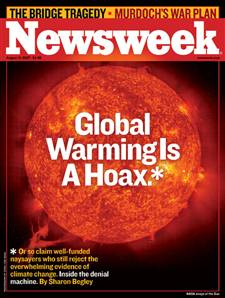Scientists: Newsweek Erred in Global Warming Coverage
Scientists: Newsweek Erred in Global Warming Coverage
The University of Alabama
August 13, 2007
A statement from the University of Alabama argues that a recent Newsweek cover story on climate change made two important mistakes.
A recent Newsweek magazine cover story on global warming contained significant errors and used outdated scientific material in its representation of global climate data collected by satellites, according to the scientists who maintain that dataset at The University of Alabama in Huntsville.
Dr. John Christy and Dr. Roy Spencer, who created and maintain the global temperature dataset, are available to answer questions about how instruments aboard NOAA satellites collect temperature data, and about the accuracy of that data. The most recent monthly update of global temperatures shows a warming trend of about 0.25° Fahrenheit per decade (about 0.14 C) since satellites started collecting the data in late 1978.
“One of the more egregious errors in the Newsweek article is the misrepresentation of the satellite data relative to a January 2000 report from the National Academy of Sciences,” said Christy, who is director of UA-Huntsville’s Earth System Science Center and who participated in writing the 2000 NAS report. “That report did not ‘skewer’ the satellite data, as the Newsweek article contends. Instead, it found that the apparent disagreement between surface temperature records and the satellite record was not so significant as to invalidate either dataset.

|
“There were also at least two major Newsweek errors relating to research that helped us correct an error caused by degrading orbits. First, that research (which was done by scientists and not by engineers’) did not prove the satellite data are wrong while the surface data are accurate. It did help us correct a problem we had noticed but whose cause we had not identified. That is how the scientific process works. The resulting corrections, rather than being major, were rather minimal and were within our previously published margin of error.
“The other Newsweek error, which has unfortunately been widely repeated, is that the satellite data were showing no warming at the time that research was published,” Christy said. “That is not correct. By 2000 the satellite temperature dataset was clearly showing a long-term global warming trend, albeit a trend that was slightly less than the warming seen in surface data. That is still true today.”
“There has been significant research since 2000, continuing to both refine and confirm the accuracy of our satellite dataset,” said Spencer, a principal research scientist in the Earth System Science Center. “This research has been published in peer-reviewed scientific journals and is part of the public record. It is troubling that a major news organization devoting significant resources to a story about an important environmental issue would choose to cite data from seven years ago rather than current data, and would still get it wrong.”
This is a statement from The University of Alabama